#king henry vi part 2
Explore tagged Tumblr posts
Text
(Re-)Reading Shakespeare 15/38: King Henry VI Part 2
"But then we are in order when we are most out of order."
My first time reading this play and I wonder wtf is going on here. It's definitely alot. First of all England is not in a good place, because the nobles are not happy with Henry marrying Margaret and establishing peace with France instead of claiming the French throne and therefore there is a lot of distrust from the start. As Henry also comes off as being very naive everyone is plotting against each other to become the no. 1 person to manipulate him, including his own wife, who is absolutely fed up with Henry for not reigning autonomously, but relying heavily on Gloucester's advice. There is also Gloucester's wife Eleanor who makes use of witchcraft to get husband, apparenty the only trustworthy person left at court,aspire to become King himself instead of just protector. Tellingly, evil women and witchcraft are once again a theme in this play and women are presented as the real puppet masters at court as they are controlling their husbands. When Henry finally emancipates himself and fires Gloucester as protector this leads not only to Gloucester's death, but also to several rebellions: all signs imply that Henry is not fit to be King, although I personally really like his pacifistic, gentle form of kingship. But first the commons revolt under the lead of Cade and a short interval of the carnevealesque with Cade as king of carnival ensues: he claims to be a long lost relative who is rightful heir to the throne and promises the people free-flowing alcohol and women being up for grabs (yikes) if he becomes King. Further, he plans to abolish money and grammar, kill educated people and burn down institutions like the Parliament and London Bridge, in short, he wants to destroy culture. The question is: os this anarchy or is this just this sad little man's complex? Luckily, the people are easily swayed by the nobles' political talk and Cade needs to flee. But this is just a short breathing pause as York and his army are ready to stake his claim to the throne, and as real heir of Richard II who was usurped by Henry's grandfather, he actually has such a huge right on the throne that several nobles break their allegiance to Henry and join the revolution. It is interesting that in this play several non-kings declare themselves to be King and even gain support, because Henry is not accepted to be King, neither by the commons nor by the nobles, even not by his own wife, who rather acts like she is the King. I am so ready to read Part 3.
0 notes
Text
Favourite Shakespeare's Histories
After my other poll, I am going to be specific. There shall be a battle of the favourites!!
For the love of Shakespeare, please reblog for a better analysis
#shakespeare#william shakespeare#plays#shakespeare plays#sonnets#poetry#english literature#literature#poll#henry iv#henry iv part 1#henry iv part 2#henry v#henry vi#henry vi part 1#henry vi part 2#henry vi part 3#henry viii#king john#pericles#richard ii#richard iii#william shakespeare plays#polls
219 notes
·
View notes
Text
Shakespeare Genre Battle: Histories
I'm doing all of them. Don't worry if yours isn't in this poll.
I am including some things with disputed authorship, collaborations, and apocrypha just because.
#King John#Richard II#Henry IV Part 1#Henry IV Part 2#Henry V#Henry VI Part 1#Henry VI Part 2#Henry VI Part 3#Richard III#Henry VIII#Edward III#Sir Thomas More
83 notes
·
View notes
Text
#guy who just put his favourites and like two widely known ones that are obviously going to win#half of these my discord server has in fact made lesbians#didn't put the Macbeths cause then they'd steal Regan and Cornwall's villain4villain swag#henry iv#henry iv part 1#Henry iv part 2#much ado about nothing#the tempest#romeo and juliet#twelfth night#henry vi part 1#Henry vi#henry vi part 2#antony and cleopatra#king lear
215 notes
·
View notes
Text
The promised sequel to my previous post:
If anyone wants to help me come up with drag names for these characters, please feel free!
#i’m so sorry for this. i should not be allowed to have polls#shakespeare#king john#richard ii#henry iv part 1#henry iv part 2#henry v#the henriad#henry vi part 1#henry vi part 2#henry vi part 3#richard iii#henry viii#hotspur#henry iii#henry iv#henry vi#henry vii#poll
76 notes
·
View notes
Text
The poll about the comedies has already ended but you'll find the tragedies in my 'shakespeare' tag / my pinned post.
I'll made a final poll with the winners for comedy, tragedy 1, tragedy 2 and history when we'll have the results
#polls#shakespeare#histories#king john#henry iv part 1#henry iv part 2#henry v#henry vi part 1#henry vi part 2#henry vi part 3#henry viii#richard ii#richard iii
43 notes
·
View notes
Photo
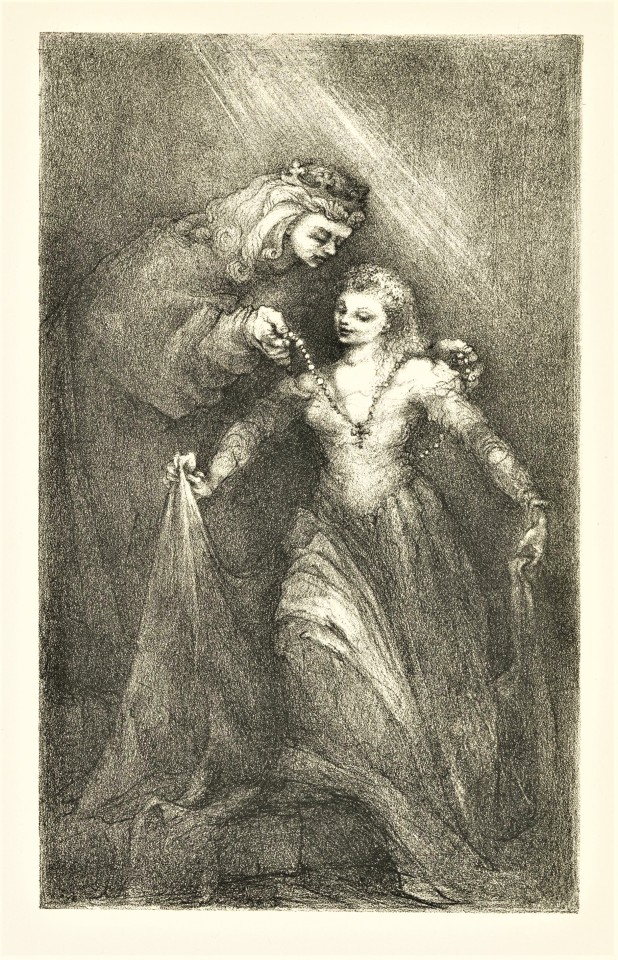







Shakespeare Weekend!
King Henry the Sixth: Part Two, of the three part play, is the thirteenth volume of the thirty-seven volume The Comedies Histories & Tragedies of William Shakespeare, published by the Limited Editions Club (LEC) from 1939-1940. The plays were first acted in 1592. The second part was published anonymously in 1594, and the third part in 1595. All three parts were published in the folio of 1623.
The LEC Part Two was illustrated in lithograph by American artist, illustrator, and printmaker Carlotta Petrina (1901-1997). Petrina illustrated many texts throughout her career, including special editions for the Limited Edition Club: South Wind by Norman Douglas and John Milton’s Paradise Lost. This was her first time illustrating a play, which provided new and exciting possibilities for her, she says:
I found a new thrill not experienced in drawing for novels or poems: that of discovery. For, in a play, one is forced to judge the characters oneself from their words and actions, rather than from descriptions of them, more as one must come to understand real people.
The volume in the set was printed in an edition of 1950 copies at the Press of A. Colish, and each volume in the set was illustrated by a different artist, but the unifying factor is that all volumes were designed by famed book and type designer Bruce Rogers and edited by the British theatre professional and Shakespeare specialist Herbert Farjeon. Our copy is number 1113, the number for long-standing LEC member Austin Fredric Lutter of Waukesha, Wisconsin.
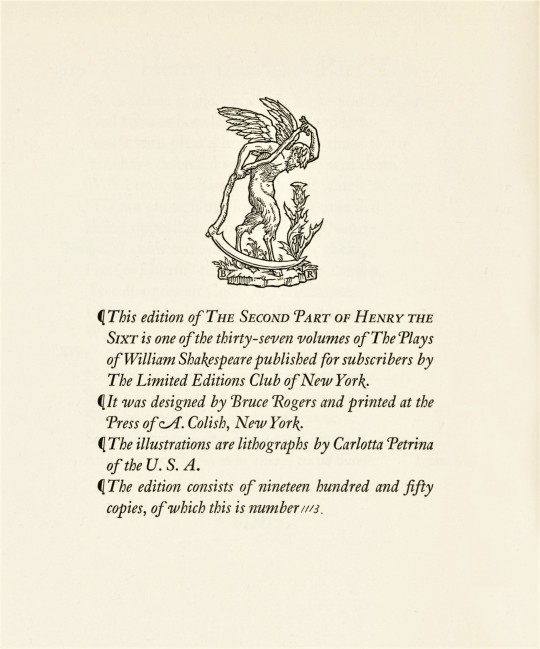
View more Limited Editions Club posts.
View more Shakespeare Weekend posts.
-Teddy, Special Collections Graduate Intern
#Shakespeare Weekend#Carlotta Petrina#Limited Editions Club#LEC#Fine press books#Lithographs#Lithography#Bruce Rogers#Press of A. Colish#King Henry the Sixth Part Two#Henry VI#Henry VI Part 2#Herbert Farjeon#Fine Press Printing#Austin Fredric Lutter#teddy
46 notes
·
View notes
Text
ultimate shakespeare play tournament


#william shakespeare#polls#poll tournament#reblog for sample size#King John#Henry VI part 2#2 henry 4
0 notes
Text
unfortunately it is not the time to be normal. it is time for me to watch richard iii (1983) directed by jane howell for the third time in six months.
#i was trying to watch other things but i couldn't leave off the henry vi trilogy wo watching richard iii#tales from diana#ron cook is sooooo good as richard#also i wonder how ppl enjoy this play (or adaptations w it) without having read/seen the 3 parts of henry vi first?#not like 'i wonder' like 'i dont see it as possible' but like this time around especially#it really just sticks w me how inseparable it is from its 3 prior history plays you know#like i first read the henry vi plays bc ned convinced me to way back in the day#and i knew nothing about any of them medieval english kings. like not the first thing#so i didnt realize r3 was immediately after them or like the same series or anything#im not even sure i understood yet how famous *some* of the history plays are yet? or. i dont remember#i still had had the riverside shakespeare for less than a year when i started reading h6#so it was still pretty new to me i suppose.#but i suppose i cant imagine how compelling richard might be wo the buildup of his characters in h6 parts 2 and 3#shakespeare does such a good job of developing his character throughout those plays that by the time you get to his own#its like YAAAASSS BITCH#KILL THEM KILL EVERYONE WE LOVE YOU YOURE PERFECT#(he is not perfect. but he is to me)
6 notes
·
View notes
Text
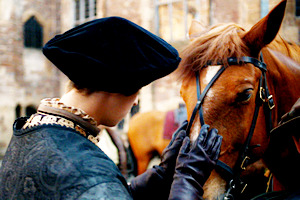
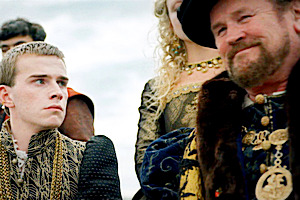
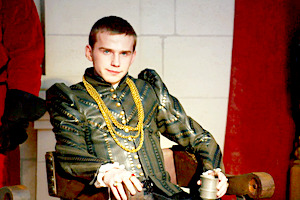

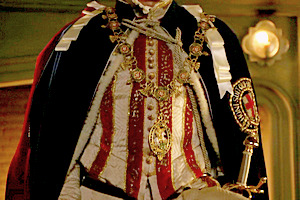
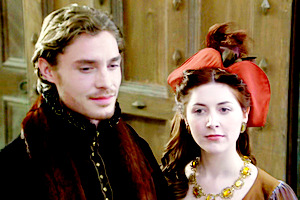
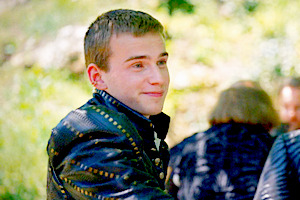
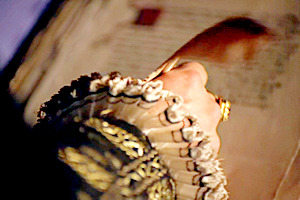
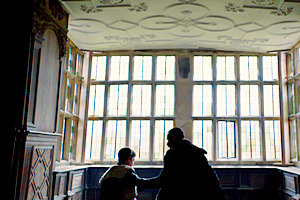
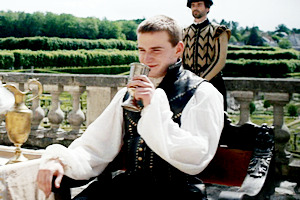
♕ @dailytudors TUDOR WEEK 2024 ♕
Day Three: Best Tudor What If >> 2/2 - HENRY FITZROY LIVES
Henry, Duke of Richmond, the beloved first son of Henry VIII born out of wedlock survives his sickness of 1536. Henry was made a possible heir to his father by the 1536 Successions Act until the birth of a child by his third stepmother Jane Seymour who had recently married his father.
During this time Fitzroy consummates his marriage with his wife Mary the daughter of the Duke of Norfolk. They later had four children, three sons one named after himself and his beloved father, one after St. George and one after his wife's father Thomas, and, a daughter named after his wife and beloved sister Mary, the latter stood as godmother to the younger Mary.
In 1537, his beloved brother, the future Edward VI is born, however Fitzroy's stepmother Jane only survives the birth by a few days. During the official mourning period Fitzroy provides a strong support to his father during his grief and emerges in court as one of the possible leading figures.
Henry then lived through his father marrying another two women, one ending in divorce and the other in execution, the latter being the cousin of his wife, but, during the time of this marriage, Fitzroy was abroad as he was the ambassador to France as he had been educated in the court of Francis I and was close friends with the Dauphin.
Once recalled from France after his father's disastrous fifth marriage he became a prominent figure in court after many leading courtiers left places vacant after being executed by his father (the gaping hole Thomas Cromwell left was widely felt even by his enemies). In this time he starts to take part in the council and education of his brother Edward with his father and appoints a few of his tutors.
In 1543 he was in attendance for his father's last marriage to Catherine Parr who is only six years his senior and was the sister of his close friend Thomas. During this time not only does Catherine bring his youngest sister Elizabeth back into the fold she also further nurtures Henry VIII's relationship with all his children and now grandchildren. Mary Fitzroy, Duchess of Richmond becomes a close confidant and part of the Queen's inner circle and the fourth lady of the court after her step-mother-in-law and sisters-in-law and even outranking the ex-Queen Anne of Cleves now known as the Kings Sister solidifying Henry Fitzroy as a possible heir after his own brother, debatably in front of his sisters.
During 1544 Henry accompanied his father on a campaign which later became known Battle of Boulogne where he learnt warfare and matters of the military.
In 1547 his beloved and larger-than-life father died, leaving his brother Edward VI a young King in his minority. Richmond's careful years of tutelage in the ever-changing court of his father proved to be a well-earned place in the council of his brother while he provided a much-needed balance between his brother's maternal family the Seymours, the rising faction of the protestants and the well-known conservative faction which included his sister Mary. During this time Henry became the leading figure of court and council and the well-accepted heir of his brother as he was the senior male.
Henry having strong links to France secured an advantageous marriage for his brother to Princess Elizabeth of France the daughter of his longtime friend which proved fruitful. It is debated that during the earlier days of his reign after his minority - before Queen Elizabeth had sons - Edward considered bestowing the title of the Duke of York on his brother.
Henry oversaw the marriages of his sons to daughters of the Seymour, Howard and Grey families and the marriage of his much-loved daughter Mary - who is said to be his favourite child - off to a son of John Dudley (Mary then ended up being a sister-in-law in marriage to her Tudor Aunt Elizabeth who had married one of John's other sons Robert).
Henry died strong in his position as the most prominent man at court after his brother, the King, having seen through and guided him in his minority. He was survived by his wife and four children.
#tudorweek2024#perioddramaedit#the tudors#becoming elizabeth#henry fitzroy#mary howard#henry viii#edward vi#my edits
66 notes
·
View notes
Text
i realise i never actually posted my shakespeare gay sex powerpoint here so i’m gonna share the rankings thumbsupemoji
here’s how much each shakespeare play would get improved by gay sex but WITHOUT the explanations.
10/10 (the winners)
- love’s labour’s lost - romeo and juliet - a midsummer night’s dream - hamlet - twelfth night - troilus and cressida - coriolanus - the tempest
9/10
- henry vi part 3 - the merchant of venice - julius caesar - pericles, prince of tyre
8/10
- titus andronicus - comedy of errors - henry iv part 1
7/10
- the taming of the shrew - richard ii (this is only because i saw a boring production once. im sure its actually great gay) - henry iv part 2 - henry v - king lear - antony and cleopatra - cymbeline
6/10
- henry vi part 2 - richard iii - king john - macbeth
5/10
- the merry wives of windsor - as you like it - henry viii
4/10
- henry vi part 1
3/10
- the two gentlemen of verona - othello (im standing by this one <3)
1/10 (there are no 2/10s)
- measure for measure - the winter’s tale
0/10
- the two noble kinsmen
-8/10
- all’s well that ends well
and an honourable mention to the much ado about nothing rank:

i am open for questions. godspeed
#shakespeare#shakespeare plays#loves labours lost#romeo and juliet#a midsummer night's dream#hamlet#twelfth night#troilus and cressida#coriolanus#the tempest#much ado about nothing#macbooth original
234 notes
·
View notes
Photo

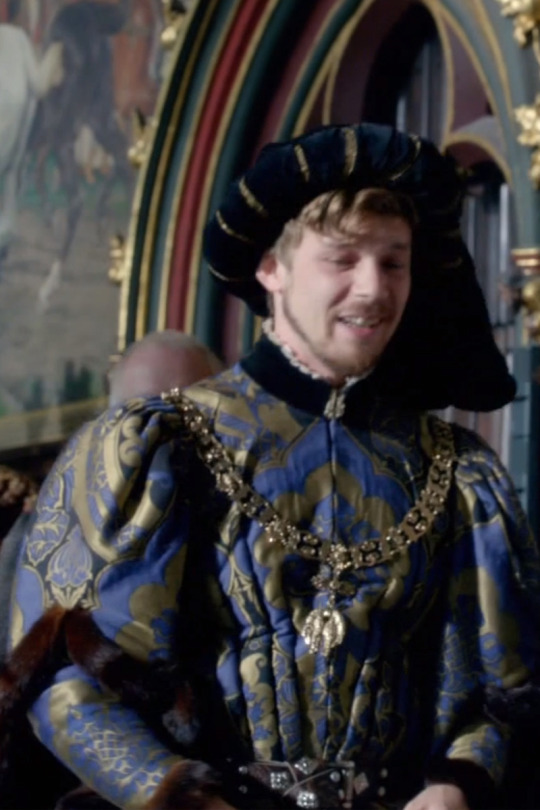

This beautiful blue and gold costume first appeared in the French TV movie Louis XI, le pouvoir fracassé (Louis XI, Shattered Power) in 2011 on Bruno Debrandt as Louis d’Orléans (future Louis XII). Then it was seen in 2013 in The White Queen, on Joren Seldeslachts as Charles, Duke of Burgundy. It went on to be used in The Hollow Crown‘s second season in the Henry VI, Part 2. It was worn by Andrew Scott as the French king Louis XI.
Costume Credit: Lucia
Follow: Website | Twitter | Facebook | Pinterest | Instagram
#Louis XI le pouvoir fracassé (Louis XI Shattered Power)#bruno debrandt#the white queen#joren seldeslachts#the hollow crown#andrew scott#costume drama#period drama
344 notes
·
View notes
Text
Amalgamations that pulled material from one or more plays can count toward seeing a production; use your judgement. If you've only seen one of these, vote for that. If you've seen multiple, but they're tied... I dunno, did you see a production twice, or does throwing in a taped version change things? There are already enough poll options here.
#shakespeare#shakespeare histories#richard ii#henry iv#henry v#henry vi#king john#henry viii#just curious which ones are done the most
22 notes
·
View notes
Text
Taylor Nick Variant Universe Brain Rot Part 2
Remember this? When I went unhinged and started coming up with an iPartment-inspired Taylor/Nick characters crossover rom-com universe???
WELL I GOT AROUND WORLD BUILDING, BUT I KIND OF NEED SOME HELP/INPUT
And yes I handwrote my ideas on paper that is my real handwriting I just think better when I write physically
So three parts:
Part 1: Family Relations
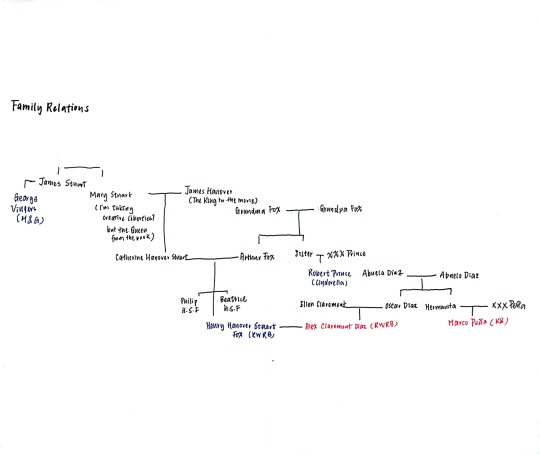
Explanation:
I made some of the characters relatives because of convenience and because it was fun
Henry's family follows the movie version, so Henry's surname is Hanover-Stuart Fox
Both the King from RWRB and the King from M&G are named James lol (the former James III of the UK; the latter James I&VI of England and Scotland), both bear the name Stuart but it's fucking weird for brothers to have the same name so I made Hanover-Stuart a joint surname only for Catherine and her children: Henry's Grandfather is a Hanover, Henry's Grandmother is a Stuart, George's lover/sugar daddy is Henry's Grandmother's younger brother
Robert (Cinderella; Nick) is from a (trashy) musical theatre movie and since Arthur Fox is an actor, I gave him a stage actress sister who's Robert's mother: Henry and Robert are cousins
During the pillow talk scene in RWRB Alex mentioned his father has a sister so I made said sister Marco's (The Kissing Booth; Taylor) mother: Alex and Marco are cousins
Part 2: Jobs/Studies
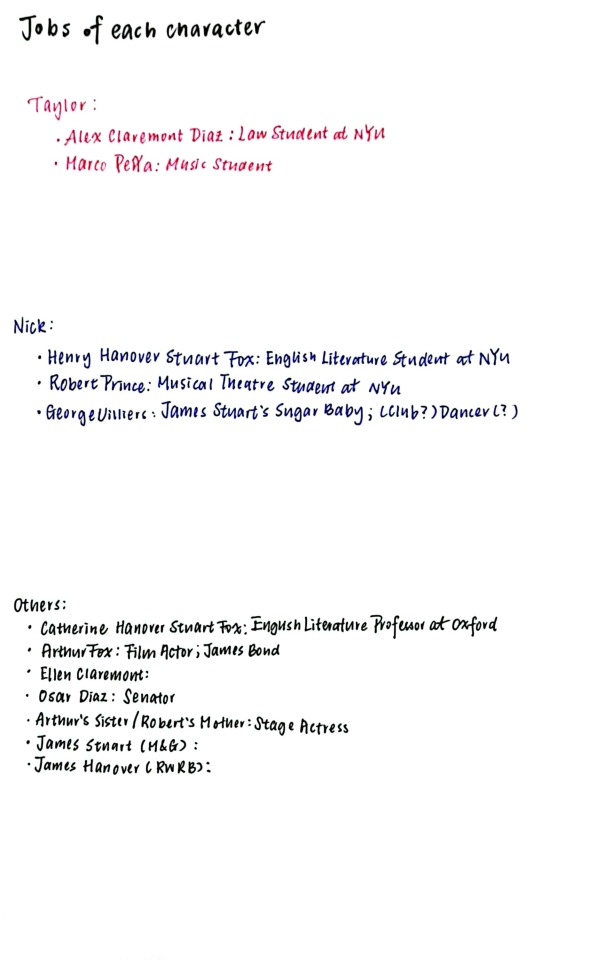
Explanation
Alex and Henry are what they are
At the end of KB3 Marco said he wanted to go to New York and become a musician so yeah
Robert is from a musical so might as well make that his study
Being a sugar baby is the best way I can translate George's situation into a modern setting
Henry's parents are as they are, with the modification that Catherine is a professor at Oxford
Oscar Diaz is as he is
Arthur's sister/Robert's mother is a stage actress
Questions/Input/Help Please
What music school in New York can Marco go to? I only know Julliard but it seems a little too unrealistic
I don't know how the American government system so if Ellen isn't president what position can I put her in? Senator too? Or something else?
What job works for Henry's grandfather and James Stuart? Does old money work? What's a modern substitute for a monarch?
George was historically a really good dancer and we're gonna see that in M&G, does it make sense to translate that into a club dancer or something? I ask as someone who has never in her life gone to a club
Part 3: Living Arrangements

Explanation:
I want them to be roommates? The fic and the show that inspired this idea was the characters living in two neighbouring apartments: 1 with 4 residents and 1 with 3 residents
I kind of want to start with all of Nick's characters in one apartment and all of Taylor's in another, then maybe mix it up as relationships develop
So for the 4-person apartment right now I have Henry and Robert
For the 2 or 3-person apartment I have Alex and Marco
George, as a sugar baby, has James giving him a luxurious loft where he lives on his own
Question:
I... don't really know how apartments in New York/ the states work? My understanding of an apartment is like one complex with a living room, dining room, bedrooms, kitchen and washrooms, and one floor of one building has a couple of those for each floor. Is the States the same? 'Cause yall live in houses and we don't really have that here? The building my apartment is in has 42 floors and each floor has 8 apartments.
Suggestion for roommates for each apartment? I need 2 Nick characters and 1 Taylor character who would be reasonable enough to share a new York flat with college students
Final Question:
Suggestion for a name for this universe/fic?
Tagging @luainthewild @henryfoxisgenderqueerandautistic
#rwrb#red white and royal blue#rwrb movie#taylor zakhar perez#nicholas galitzine#alex claremont diaz#henry fox mountchristen windsor#henry hanover stuart fox#firstprince#meraki fic#rwrb thoughts#marco peña#prince robert#george villiers
25 notes
·
View notes
Text
"Among their complaints [in 1460, the Yorkists] specifically blamed the earls of Wiltshire and Shrewsbury and Viscount Beaumont for ‘stirring’ the king [Henry VI] to hold a parliament at Coventry that would attaint them and for keeping them from the king’s presence and likely mercy, asserting that this was done against [the king's] will. To this they added the charge that these evil counselors were also tyrannizing other true men* without the king’s knowledge. Such claims of malfeasance obliquely raised the question of Henry’s fitness as a king, for how could he be deemed competent if such things happened without his knowledge and against his wishes? They also tied in rumors circulating somewhat earlier in the southern counties and likely to have originated in Calais that Henry was really ‘good and gracious Lord to the [Yorkists] since, it was alleged, he had not known of or assented to their attainders. On 11 June the king was compelled to issue a proclamation stating that they were indeed traitors and that assertions to the contrary were to be ignored." - Helen Maurer, "Margaret of Anjou: "Queenship and Power in Late Medieval England"
Three things that we can surmise from this:
We know where the "Henry was an innocent helpless king being controlled and manipulated by his Evil™ advisors" rhetoric came from**.
The Yorkists were deliberately trying to downplay Henry VI's actual role and involvement in politics and the Wars of the Roses. They cast him as a "statue of a king", blamed all royal policies and decisions on others*** (claiming that Henry wasn't even aware of them), and framed themselves as righteous and misunderstood counselors who remained loyal to the crown. We should keep this in mind when we look at chronicles' comments of Henry's alleged passivity and the so-called "role reversal" between him and Queen Margaret.
Henry VI's actual agency and involvement is nevertheless proven by his own actions. We know what he thought of the Yorkists, and we know he took the effort to publicly counter their claims through a proclamation of his own. That speaks louder than the politically motivated narrative of his enemies, don't you think?
*There was some truth to these criticisms. For example, Wiltshire (ie: one of the men named in the pamphlet) was reportedly involved in a horrible situation in June which included hangings and imprisonments for tax resistance in Newbury. The best propagandists always contain a degree of truth, etc. **I've seen some theories on why Margaret of Anjou wasn't mentioned in these pamphlets alongside the others even though she was clearly being vilified during that time as well, and honestly, I think those speculations are mostly unnecessary. Margaret was absent because it was regarded as very unseemly to target queens in such an officially public manner. We see a similar situation a decade later: Elizabeth Woodville was vilified and her whole family - popularly and administratively known as "the queen's kin" - was disparaged in Warwick and Clarence's pamphlets. This would have inevitably associated her with their official complaints far more than Margaret had been, but she was also not directly mentioned. It was simply not considered appropriate. ***This narrative was begun by the Duke of York & Warwick and was - demonstrably - already widespread by the end of 1460. When Edward IV came to power, there seems to have been a slight shift in how he spoke of Henry (he referred to Henry as their "great enemy and adversary"; his envoys were clearly willing to acknowledge Henry's role in Lancastrian resistance to Yorkist rule; etc), but he nevertheless continued the former narrative for the most part. I think this was because 1) it was already well-established and widespread by his father, and 2) downplaying Henry's authority would have served to emphasize Edward's own kingship, which was probably advantageous for a usurper whose deposed rival was still alive and out of reach. In some sense, the Lancastrians did the same thing with their own propaganda across the 1460s, which was clearly not as effective in terms of garnering support and is too long to get into right now, but was still very relevant when it came to emphasizing their own right to the throne while disparaging the Yorkists' claim.
#henry vi#my post#wars of the roses#margaret of anjou#Look I’m not trying to argue that Henry VI was secretly some kind of Perfect King™ whose only misfortune was to be targeted by the Yorkists#That is...obviously pushing it and obviously not true#Henry was very imperfect; he did make lots of errors and haphazard/unpopular decisions; and he did ultimately lose/concede defeat#in both the Hundred Years War and the subsequent Wars of the Roses.#He was also clearly less effective than his predecessor and successor (who unfortunately happened to be his father and usurper respectively#and that comparison will always affect our view of his kingship. It's inevitable and in some sense understandable.#But it's hardly fair to simply accept and parrot the Yorkist narrative of him being a “puppet of a king”.#Henry *did* have agency and he was demonstrably involved in the events around him#From sponsoring alchemists to issuing proclamations to participating in trials against the Yorkists (described in the 1459 attainder)#We also know that he was involved in administration though it seems as though he was being heavily advised/handheld by his councilors#That may be the grain of truth which the Yorkists' image of him was based on.#But regardless of Henry's aptitude he was clearly *involved* in ruling#Just like he was involved in plots against Yorkist rule in the early 1460s before he was captured.#And he did have some successes! For example in 1456 he travelled to Chester and seems to have been responsible#for reconciling Nicholas ap Gruffyd & his sons to the crown and granting them a general pardon.#Bizarrely Ralph Griffiths has credited Margaret for this even though there is literally no evidence that she was involved.#We don't even know if she travelled with Henry and the patent rolls offering the pardon never mention her.#Griffiths seems to have simply assumed that it was Margaret's doing because of 1) his own assumption that she was entirely in control#while Henry was entirely passive and 2) because it (temporarily) worked against Yorkist interests.#It's quite frustrating because this one of the most probable examples we have of Henry's own participation in ruling in the late 1450s#But as usual his involvement is ignored :/#Also all things considered:#The verdict on Henry's kingship may not have been so damning if his rule hadn't been opposed or if the Lancastrians had won the war?#Imo it's doubtful he would be remembered very well (his policies re the HYW and the economic problems of that time were hardly ideal)#but I think it's unlikely that he would have been remembered as a 'failed king' / antithesis of ideal kingship either#Does this make sense? (Henry VI experts please chime in because I am decidedly not one lol)
12 notes
·
View notes
Text
#next time it’s the henries in a drag race. somebody stop me#sorry if i missed some gloucesters#gloucester in lear has no canonical name yet i’ve decided it’s edward. a family of eds#shakespeare#poll#richard ii#henry iv#henry iv part 2#henry v#henry vi#henry vi part 1#henry vi part 2#henry vi part 3#richard iii#king lear#polls#original post
93 notes
·
View notes